Lead tracking software is essential for managing your potential clients throughout the sales process.
It centralizes crucial information, which allows sales teams to do all the lead tracking in one place, including:
- track lead interactions,
- identify the most promising leads,
- better prioritize follow-ups.
We wrapped up the nine best lead tracking software and tools to use in 2025 to get more leads, close more deals, and make a profit.
What is lead tracking?
Lead tracking is the process of monitoring and managing your inbound and outbound leads from their initial contact to conversion.
The goal of lead tracking is to capture data on customer behavior, engagement, and progress through the sales pipeline in order to:
- improve conversion rates,
- focus on high-value leads first,
- score and prioritize your leads,
- monitor your sales pipeline,
- make data-driven decisions,
- optimize your marketing efforts,
- maximize your sales strategy,
- know when exactly to follow up,
- prevent missed sales opportunities,
- know precise timing in a sales engagement.
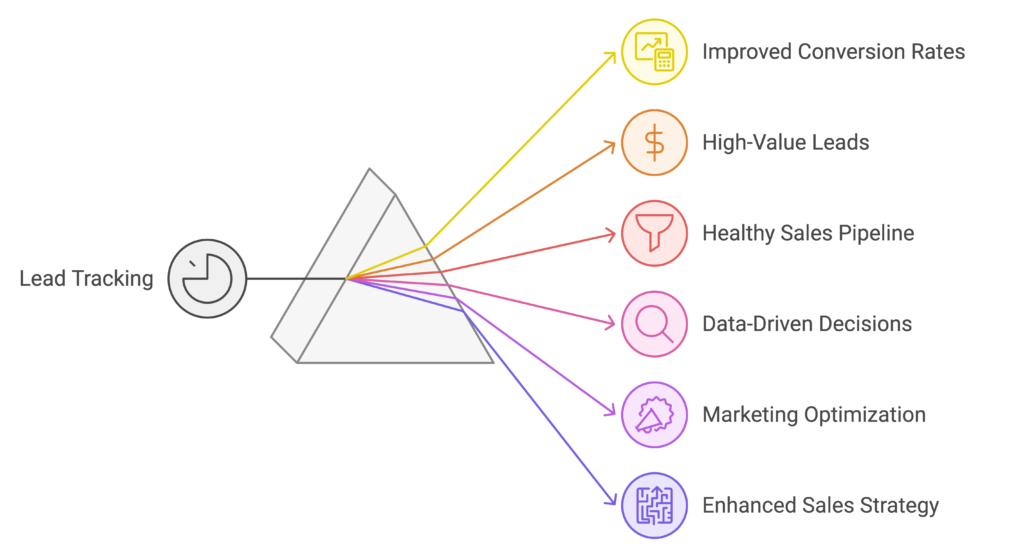
If done right, lead tracking leads to a healthy sales pipeline full of incoming leads.
As a result, businesses can expect more satisfied customers, less churn, and higher ROI.
However, manually tracking leads is time-consuming and prone to errors. As businesses grow, managing numerous leads without automation leads to missed sales opportunities and data inefficiencies.
Modern lead tracking software offers automated solutions that streamline the process, providing real-time insights, seamless data management, and integration with other sales tools.
These capabilities allow sales teams to focus on building relationships and closing deals rather than spending excessive time on data entry and organization.
What do you need in lead tracking software?
When businesses say they’re looking for a lead tracking software solution, they typically want one of these things:
- a CRM with built-in lead tracking features,
- a standalone lead tracking and management software that integrates with their CRM system.
Although closely related to customer relationship management software, lead tracking software focuses on your leads inside the sales pipeline.
With the right tool, salespeople can convert the data into the steps they need to make at the given time to push their leads further down the sales pipeline.
The goal of your lead tracking software is to convert more leads into customers more easily, faster, and with less effort, which makes the process scalable and very profitable.
In order to choose the best lead tracking tool, you want to look for these crucial characteristics:
- Lead capture: Lead tracking software is worth nothing if it doesn’t capture new leads from various sources (social media, outreach, inbound traffic, calls, email marketing and so on), and collects the data about them.
- Lead scoring and segmentation: Segmenting your leads by criteria and assigning them a score of how much they’re likely to convert is key to generating more conversions. This capability is something you definitely want to see in your lead tracking software.
- Lead tracking at all stages of the sales pipeline: This is a no-brainer. Your lead tracking solution must give you a detailed and comprehensive view of where each lead is at in your sales pipeline.
- Automating your workflow: Repetitive tasks must be automated to optimize your workflow. Think of features like lead assignments, follow-up reminders, and so on.
- Integrations: Check if the lead management software integrates seamlessly with your existing CRM. All you want from your lead tracking software is a super smooth data transfer and automated workflow you don’t have to even think about.
- Analytics and reporting: When choosing a tool for lead tracking, robust analytics are one of the key features for better profit-driven decisions. Insights like conversion rates, lead and sales rep performance will give you a very clear data-backed overview of your sales processes.
- Customizable dashboards: Your goal is to make your lead tracking software work for you and not vice versa. For this reason, we recommend looking at the tools with the most customizable dashboard features.
9 best lead tracking software in 2025
1. lemlist is the best sales engagement software with advanced lead features for sales teams
Rating: ⭐⭐⭐⭐⭐ G2 – 4.5/5 | Capterra – 4.6/5
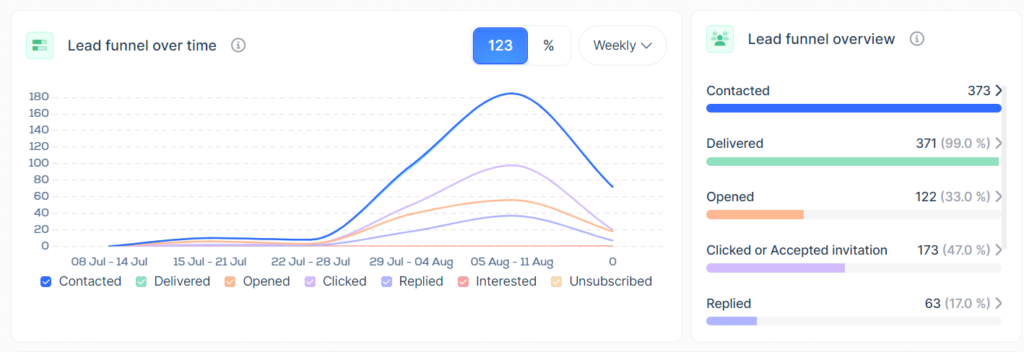
To avoid jumping between different tools and paying for each of them, you want to choose a software solution that has as many lead-focused features as possible.
lemlist is unbeatable in not just tracking but generating leads and engaging your prospects in high-performing campaigns.
Plus, it excels at lead capture features with advanced Google Chrome extensions, email finders and verifiers, a people database, and a Company database.
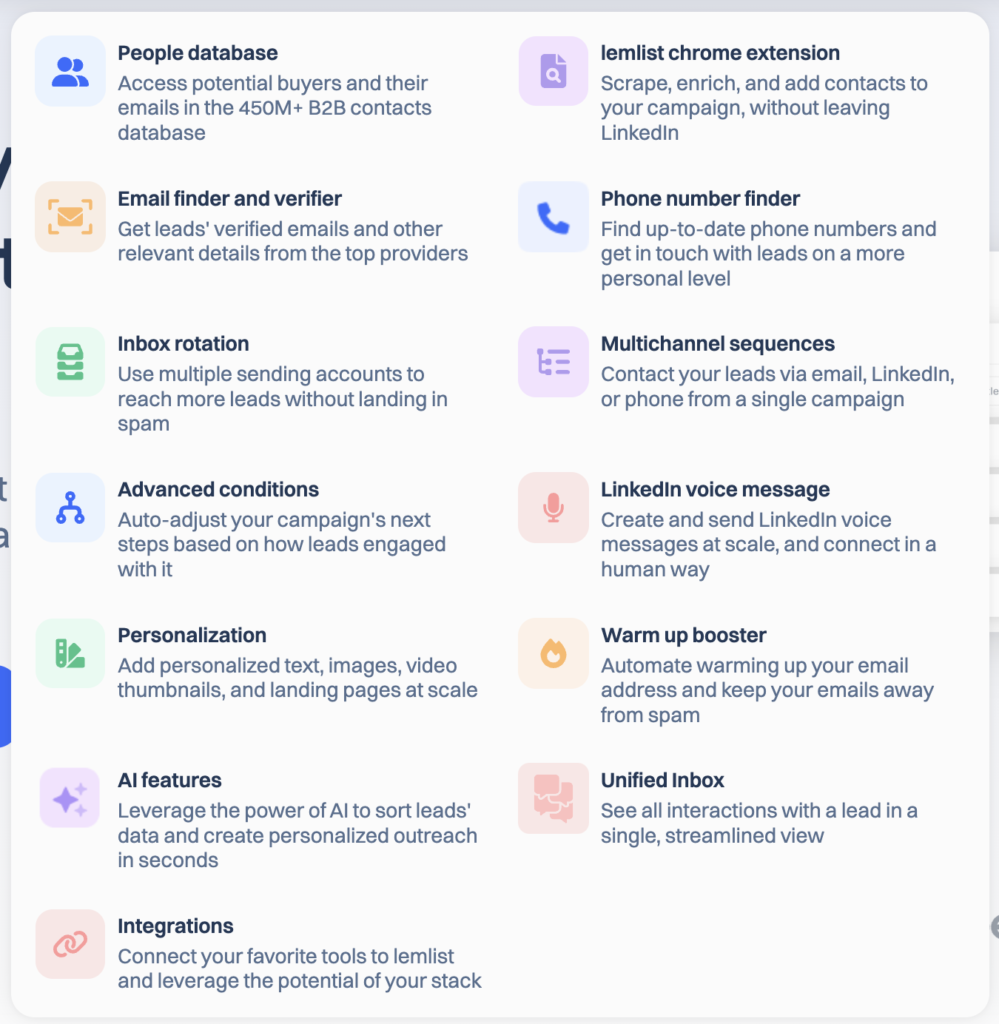
lemlist’s best features for lead tracking and lead generation:
- Email finders and verifiers
- Chrome extensions: 1-click lead data extraction
- Access to the largest lead database of 450M+ active contacts
- Email marketing and cold outreach: create and automate AI-powered full sequences that are personalized for every lead
- Calendar and call scheduling tools to book more meetings with your leads
- The best-performing templates in your dashboard to replicate
- Unified inbox that centralizes all lead conversations in one place (regardless of the channel, account, or sending email)
- Centralized multichannel outreach: a complete history and 360* view of your interactions with leads
- A/B testing
Pros:
- Very feature-rich software
- User-friendly tool
- Excellent for sales teams
- Performance-driven approach to lead engagement backed by data
- Very responsive customer support
- Stellar educational materials and knowledge base
- Relatively inexpensive for what you get
Cons:
- No dedicated lead tracking
2. HubSpot Sales Hub is the best lead tracking software for medium businesses
Rating: ⭐⭐⭐⭐ G2 – 4.4/5 | Capterra – 4.5/5
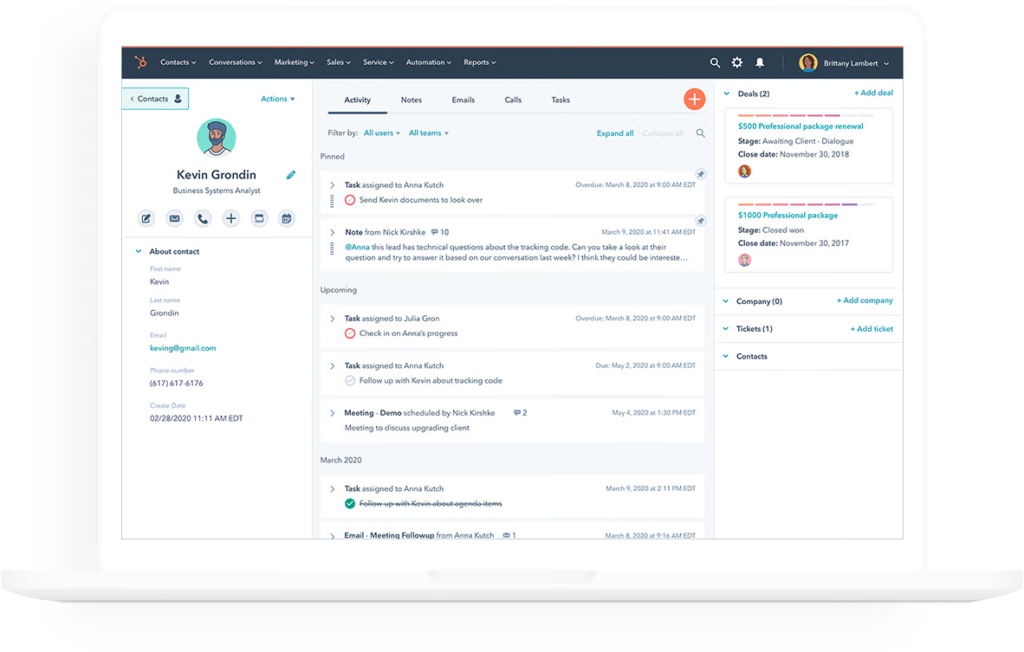
HubSpot’s best features for lead tracking:
- Get full visibility into each lead’s journey
- Streamline automated lead assignments and follow-ups
- Use custom criteria to automatically score and prioritize leads
- Segment leads according to data
- Deal management tools
Pros:
- Prospecting dashboard offers a pretty good overview
- Summarized key metrics
- User-friendly interface
Cons:
- Expensive onboarding
- Add-ons can be added automatically
- No A/B testing on the platform
- Sales prospecting features are somewhat limited compared with other solutions on this list
3. Salesforce is the best advanced CRM with lead tracking features for large businesses
Rating: ⭐⭐⭐⭐ G2 – 4.3/5 | Capterra – 4.4/5
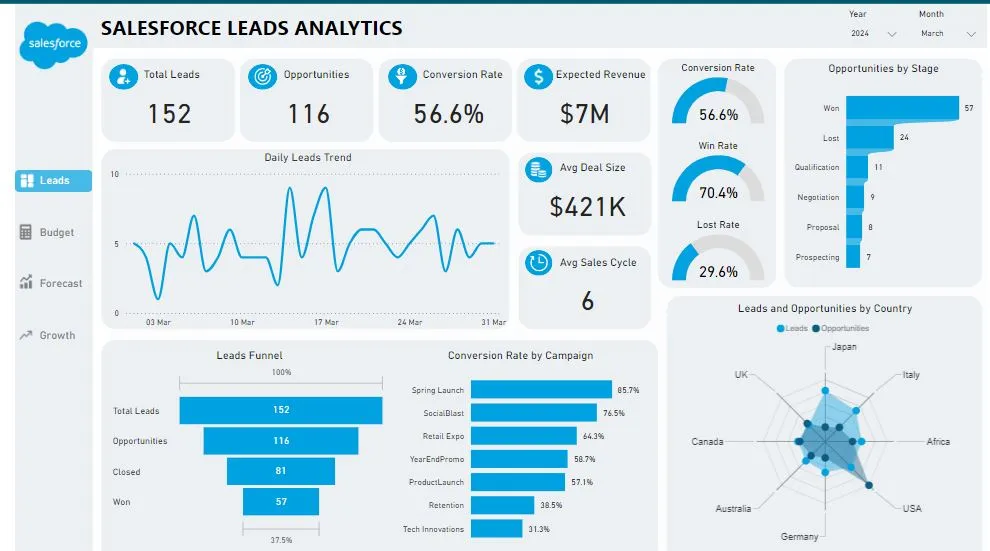
Salesforce’s best features for lead tracking:
- Lead tracking and management through the sales pipeline
- Customizable reports and dashboard
- Automations: data entry, follow-ups, and email reminders
- Sales forecasting feature based on pipeline stages, historical data, sales rep inputs
Pros:
- Many advanced features released often
- Robust social collaboration tools and great workflows
- Marketplace for third-party apps
- Very good and seamless integrations
Cons:
- It can get expensive very quickly
- Steep learning curve
- It logs you out multiple times
- UI needs an update
- A mobile version is average
4. Pipedrive CRM is the best sales-focused CRM for small and medium businesses
Rating: ⭐⭐⭐⭐ G2 – 4.3/5 | Capterra – 4.5/5
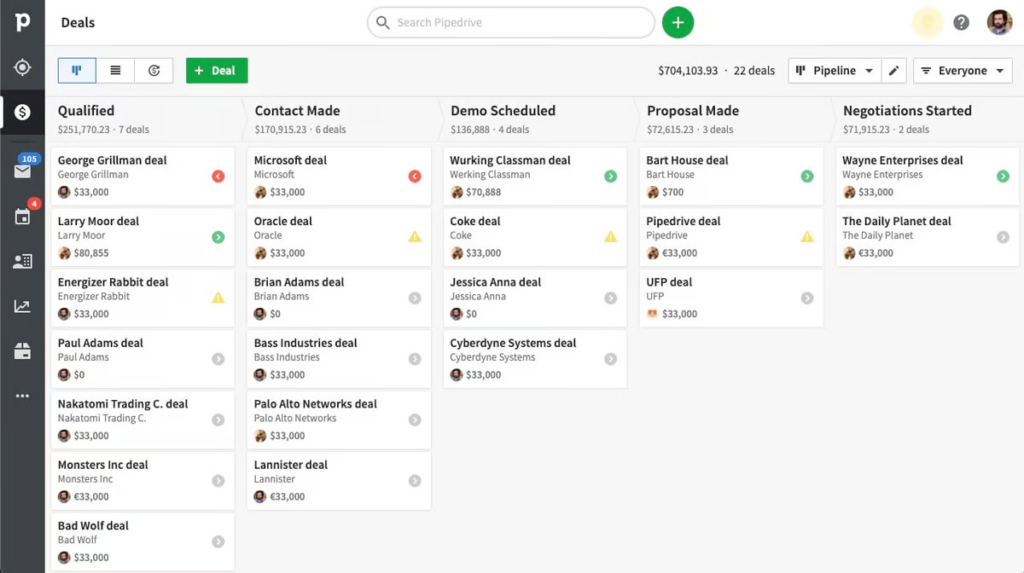
Best lead tracking features:
- Revenue forecasting
- Custom field reporting
- Lead development cycles
- Real-time sales reporting
Pros:
- Intuitive interface and smart workflow
- Mobile app, email, and call synchronization
Cons:
- Low value for money
- No separation between lists of new leads and contacts
- Need to pay extra for more advanced features like LeadBooster add-on for $39/month and lead engagement in campaigns add-on ($24/month)
- Costs quickly add to the app
5. Zoho CRM is the most affordable software for lead tracking
Rating: ⭐⭐⭐⭐ G2 – 4.1/5 | Capterra – 4.3/5
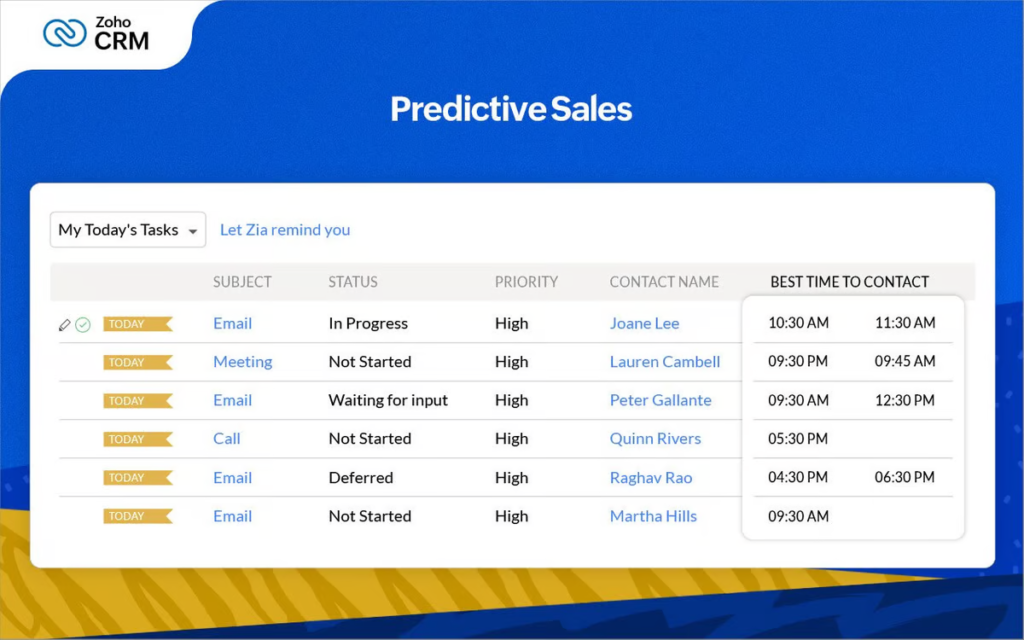
Best lead tracking features:
- Automate lead management workflows
- Filter and assess leads
- Track leads from start to finish
- Customization options, including drag and drop feature
Pros:
- Easy to use
- Affordable
Cons:
- During large datasets, performance is low
- Advanced features like flexible AI is only available at higher price tiers
- Limited integrations
- Lead tracking capabilities are pretty basic compared to competitor offers
6. Monday CRM is the best lead tracking software that focuses on project management
Rating: ⭐⭐⭐⭐⭐ G2 – 4.6/5 | Capterra – 4.7/5
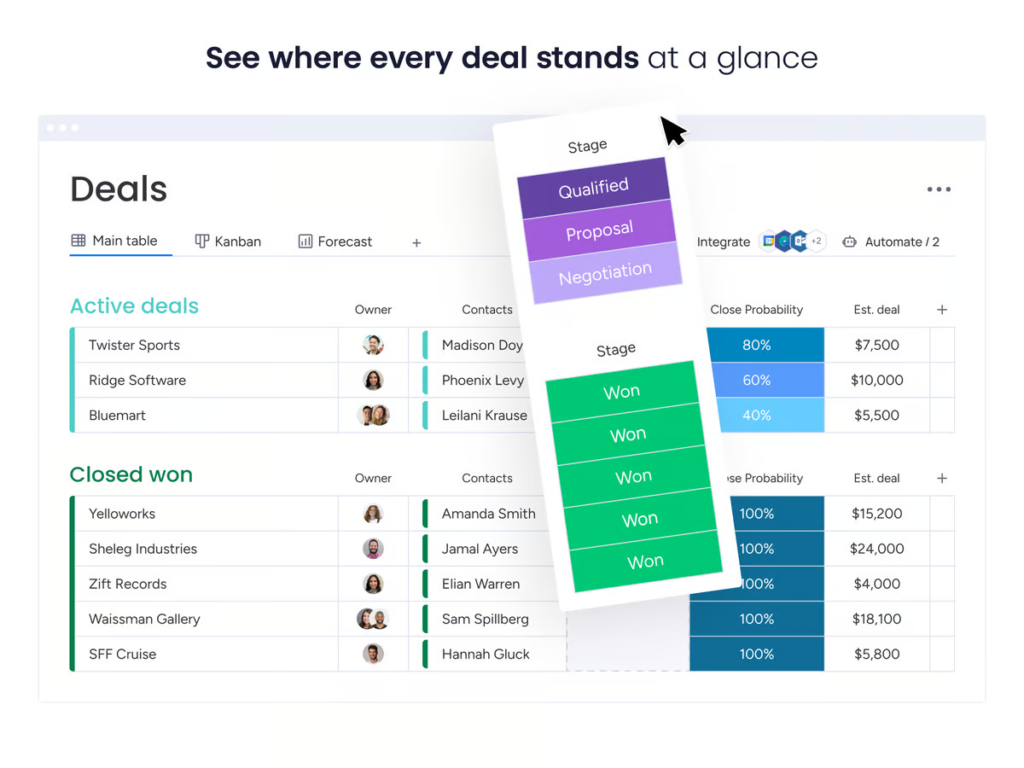
Best features for lead tracking:
- Collect leads from any source and centralize them
- Centralized lead qualification
- Lead scoring based on your criteria
- A 360° view of your customers
- Sales dashboards
- Funnel chart and leaderboard
Pros:
- Intuitive interface
- Affordable pricing
Cons
- Limited marketing functions
- Time tracking only on Pro projects plan
- No “undo” option
- Limited reporting and no advanced analytics
- The mobile app isn’t functional enough
- Onboarding can be confusing
- The dashboard feature needs improvement
7. ClickUp is the best software for basic lead management needs
Rating: ⭐⭐⭐⭐⭐ G2 – 4.7/5 | Capterra – 4.6/5
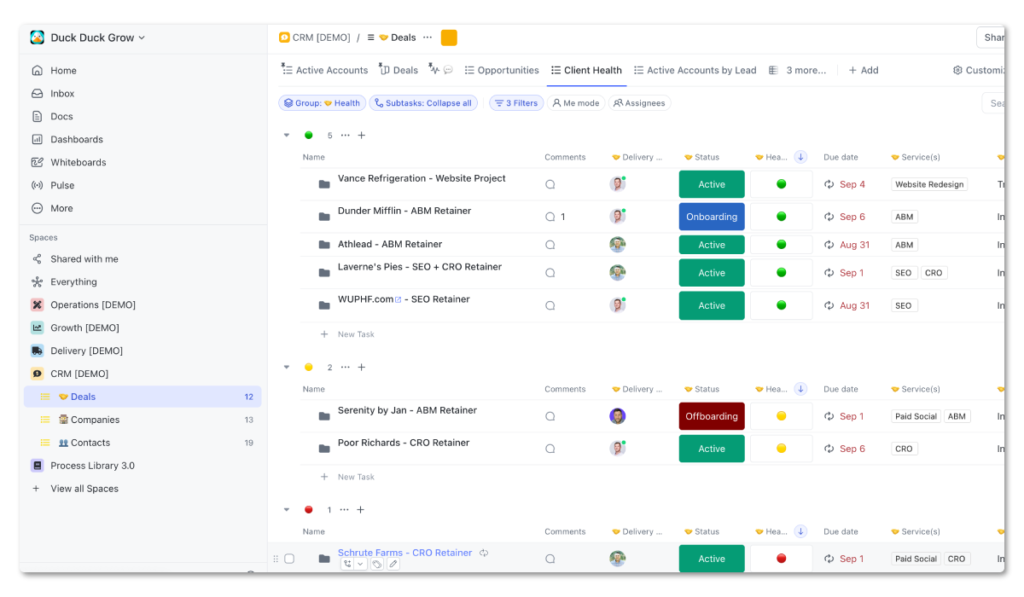
Best features for lead tracking:
- Tailored dashboards for team management
- Commission tracking and sales reports
- Automation features for easier data entry
Pros:
- Relatively Affordable
- Lists for lead tracking
Cons:
- Features are pretty basic and may not cover more advanced lead tracking needs
- No sales engagement features
- Value for money is quite average
8. Freshsales by Freshworks is the best software for lead review workflows
Rating: ⭐⭐⭐⭐⭐ G2 – 4.5/5 | Capterra – 4.5/5
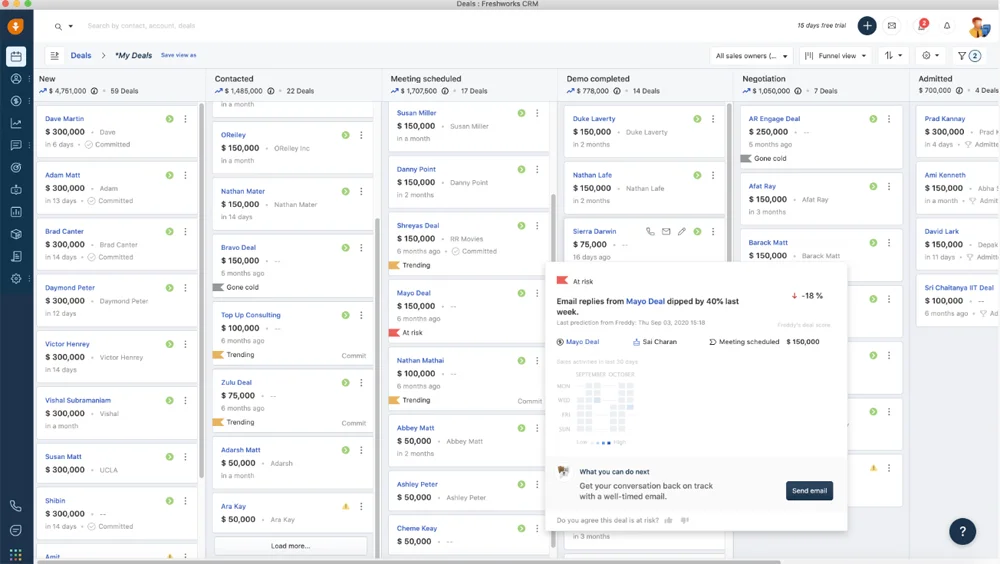
Best features for lead tracking:
- Automated lead review workflows
- AI-powered contact and deal-scoring features
- Easy data import and export
Pros:
- Solid features and reliable software
- Great lead workflow automations
Cons:
- Steep learning curve
- AI assistant “Einstein 1” is only available in higher tiers
- Complicated integrations with other tools
9. Salesflare is the best lead management software for small businesses with Google Workspace
Rating: ⭐⭐⭐⭐⭐ G2 – 4.8/5 | Capterra – 4.7/5
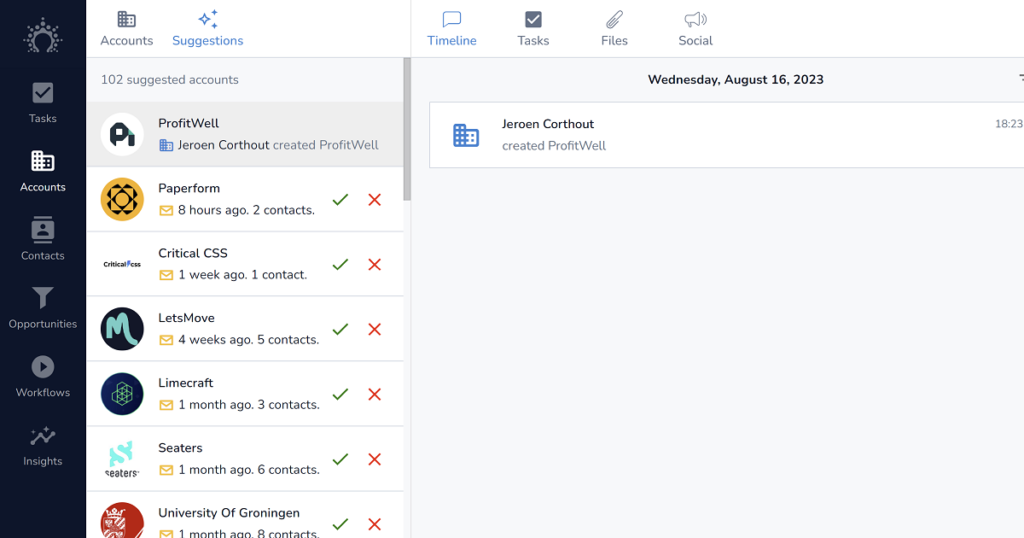
Best features for lead tracking:
- Automation features to gather data, log phone calls and meetings
- Lead email-finding tool
- Automatic lead enrichment feature
- Drag-and-drop pipelines for lead visualization
- Track the source (and lost reason) of your leads
Pros:
- Sign-up is fast and easy
- Tightly integrated with Google Workspace and Outlook
Cons:
- The tool can be too simplistic
- Lacks robust feature sets
- Pricey on higher tiers
Depending on your company goals and how your sales team is managing their sales pipeline, you may want to use a tool not mentioned in this list.
To find out more about lead CRM alternatives, we suggest looking into the best sales CRM tools and the best free CRM options, as well as the best CRM for small business.
Do you need lead tracking software?
If you want to close more deals faster and easier, then yes, software for lead tracking and management is essential. It helps organize and monitor leads efficiently for timely follow-ups and improves conversion rates.
The software provides crucial insights into lead behavior and sales progress, allowing for more informed decision-making.
By automating data collection and reporting, it frees up time for sales teams to focus on engaging with prospects and closing deals.
How do you choose the best lead tracking software?
Make a list of criteria you want your lead tracking software to have, and evaluate every option according to it.
For some businesses, ease of use and quick onboarding will be a priority. Other businesses will prioritize lead capture features, while some companies will like more advanced lead generation capabilities.
Think of the recent struggles you had when tracking your leads: was it workflow automations or missed sales opportunities due to badly timed follow-ups?
Your top lead tracking tool should be a solution to whatever lead-related problem you’re having.
Key Takeaways
Lead tracking software is crucial for managing client interactions throughout the sales process, enabling better prioritization and follow-ups.
It offers centralized data, improves conversion rates, and allows for data-driven decision-making by providing real-time insights into customer behavior and sales progress.
Automating these tasks helps sales teams focus on building relationships and closing deals.
Essential features in lead tracking software include lead data capture, scoring, workflow automation, and integration with CRM systems.
Popular tools include lemlist, HubSpot, and Salesforce, each with unique strengths depending on your business needs.

